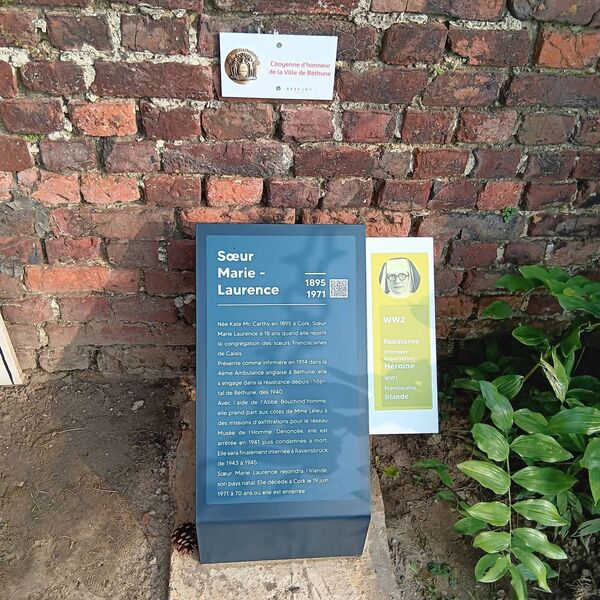Heroic Cork nun who saved hundreds of lives in two world wars honoured by Béthune, France
A French town has honoured an Irish nun who “fought in the shadows” to save hundreds of lives during two world wars.
The authorities in Béthune in northern France unveiled a lectern and photograph in a quiet corner of the city’s northern cemetery to recognise Cork-born Sr Marie Laurence’s heroic role with the French Resistance.
She was among four remarkable French, Belgian and Irish women — including Sylvette Leleu, Louise Delestrez, and Françoise Beaurain, who all joined the French Resistance in Béthune during the Nazi occupation in the Second World War — who were honoured in the poignant ceremony.
Sr Marie Laurence’s niece, Loretto nun Sr Breda McCarthy, two grandnieces, Caitriona Hayes and Siobhan Sheils, and Valérie David-McGonnell, the President of Alliance Française de Cork, were among those who attended, along with Hannah E Twomey, Consul of Ireland to Paris.
“Although Sr Marie Laurence is buried in Saint Finbarr’s Cemetery in Cork, a commemorative lectern with her photograph and story now stands in the sisters’ plot in Béthune’s north cemetery,” Ms David-McGonnell said.
Born Kate McCarthy in Drimoleague, Co Cork, in December 1895, she received the name Sr Marie Laurence when she joined the order of the Franciscans in 1913 and was transferred to Calais, France, where she served as a nurse at the Béthune Hospital during the First World War.
After the Great War, she went to America, before returning to Béthune Hospital in 1940, where she nursed wounded soldiers and civilians.
She joined the Musée de l’Homme Resistance network that same year and helped about 120 Allied soldiers escape to England.
She was arrested by the Gestapo on June 18, 1941, imprisoned, and interrogated for having passed on strategic maps to the Resistance.
She was held in different prisons from June 1941 until August 1942, including the notorious Ravensbrück women’s concentration camp.
Forced to do physical work with almost no food, her weight fell from 70kg to 27kg — about four stone — before the camp was liberated on April 30, 1945, two days after Hitler’s suicide. She and the other survivors were handed over to the Red Cross. ♦
This article by Eoin English originally appeared in the Irish Examiner on June 3, 2024.




Leave a Reply